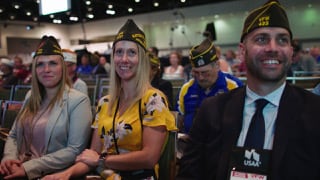Your local VFW is no longer the hall that hosted Grampa’s bingo night. Instead, it’s a hub of Post-9/11 and Iraq and Afghanistan veterans supporting the same mission the VFW has supported since its inception in 1899: veteran transition, support, and kinship.
That old brick building with the flags you remember as a child, filled with old guys in hats, is now your new clubhouse, where you can meet up, laugh, shoot the breeze and share war stories with your peers. Not just that crazy night in Kabul, but the victory over finally extracting every penny from your personal GI Bill. Better yet, it’s a place where you get to stand up and share your personal experience and hard-won knowledge with other members and help a fellow veteran.
The older generation still attends — sadly, in much smaller numbers — but the new face of the VFW looks like you. Diversity is respected, women are gaining in the ranks, and LGBT events are the new normal. The word is modernization; Yoga Sunday might be calendared next to a USA JOBS CV assistance seminar, while members participate in mud runs, charity building projects, and neighborhood street parties.
But what you may not know is that the VFW has been supporting the pre-discharge transitioning process since 2001. The organization also provides educational and employment assistance and strongly supports veterans’ mental health initiatives in combating PTSD.
VFW Transition Services
The VFW was created to provide necessary services to veterans. Those services begin before you even leave the ranks. The VFW’s Pre-Discharge program is a cooperative initiative with the Pentagon and the Department of Veterans Affairs. The program ensures that both separating and retiring active-duty military personnel receive the necessary assistance to obtain their VA entitlements and benefits before they’re discharged.
VFW Pre-Discharge representatives guide military personnel through the VA claims process and can assist with preparing and submitting forms and evidence to the VA before separation from active duty. They can also answer questions about VA benefits and entitlements. Their Pre-Discharge offices are located on or near major military installations across the country.
Educational Grants and Scholarships
The VFW also supports members and veterans in furthering their education. They provide educational assistance through various scholarship awards and grant initiatives. For example, the organization is currently teamed up with the Student Veterans of America and Sport Clips “Help a Veteran” to provide educational assistance to E-5s and below. Those who qualify can be awarded a grant of 5k a semester.
They also offer the smaller VFW’s Student Veteran Support Grant, which offers between $500 and 1k a year for qualified veterans currently enrolled at an institution of higher learning.
Legislative fellowships are available for exemplary current students interested in advancing the cause of veterans on Washington DC’s Capitol Hill during the Spring term.
PTSD/Mental Health Assistance
The VFW works to help veterans suffering from depression and stress related to their time in service and beyond. VFW leadership says it is committed to helping change the narrative and stigma surrounding mental health and PTSD in America.
The VFW currently works to raise awareness, foster community engagement, improve research, and provide intervention for those affected by invisible injuries and emotional stress. They work closely with several national organizations that tackle mental health issues: Give an Hour –The Campaign to Change Direction, One Mind, PatientsLikeMe, and the Elizabeth Dole Foundation to combat the critical problem of PTSD and veteran suicide.
Diversity and Equality
The old boys club is a thing of the past. The number of women veterans in the organization has increased by over 10% since July 2021 and is still climbing.
“Women members now stand at approximately 35,000,” said Randi K. Law, Director of Communications, VFW National Headquarters.
Along with female members and leadership, many posts support, host, participate in, or sponsor LGBTQ events throughout the year. Additionally, many post members and elected leaders are open members of the LGBTQ community. A Denver post elected the VFW’s first openly gay commander way back in 2016. Other posts plan to support gay veterans by participating in events during Gay Pride month.
The Social Aspect
Members make of the VFW what they choose — attending meetings casually, taking advantage of the transitioning services, or just making new friends who understand their background and stressors. If you’re lucky, there’s still a WWII, Korean, or Vietnam Vet member to mentor you or trade stories over a BBQ.
What makes the organization unique is that VFW members face the same hurdles you’re trying to clear after leaving service. The VFW would like you to consider the organization as a built-in social network – both on a national level and on a very local and personal level.
After separation, your friends have retired to the four corners, but there’s probably an established Post nearby – a room or network of veterans waiting to meet you. You can also use your local Post to help find a job or offer a job to veterans if it’s your company hiring. All Posts are different, but they have networks attached to more networks, all with the same aim, to keep you going.
Some cities have several Posts; some have only one that services an entire community. If you find an older Post with few members, you can recruit your friends to join, run for office, and modernize the place as you go. The national office is ready to support you in bringing the place up to speed if needed. If you’re fortunate, your local might also be a Post that hosts pizza night with a kegger on the first Friday night of the month.





